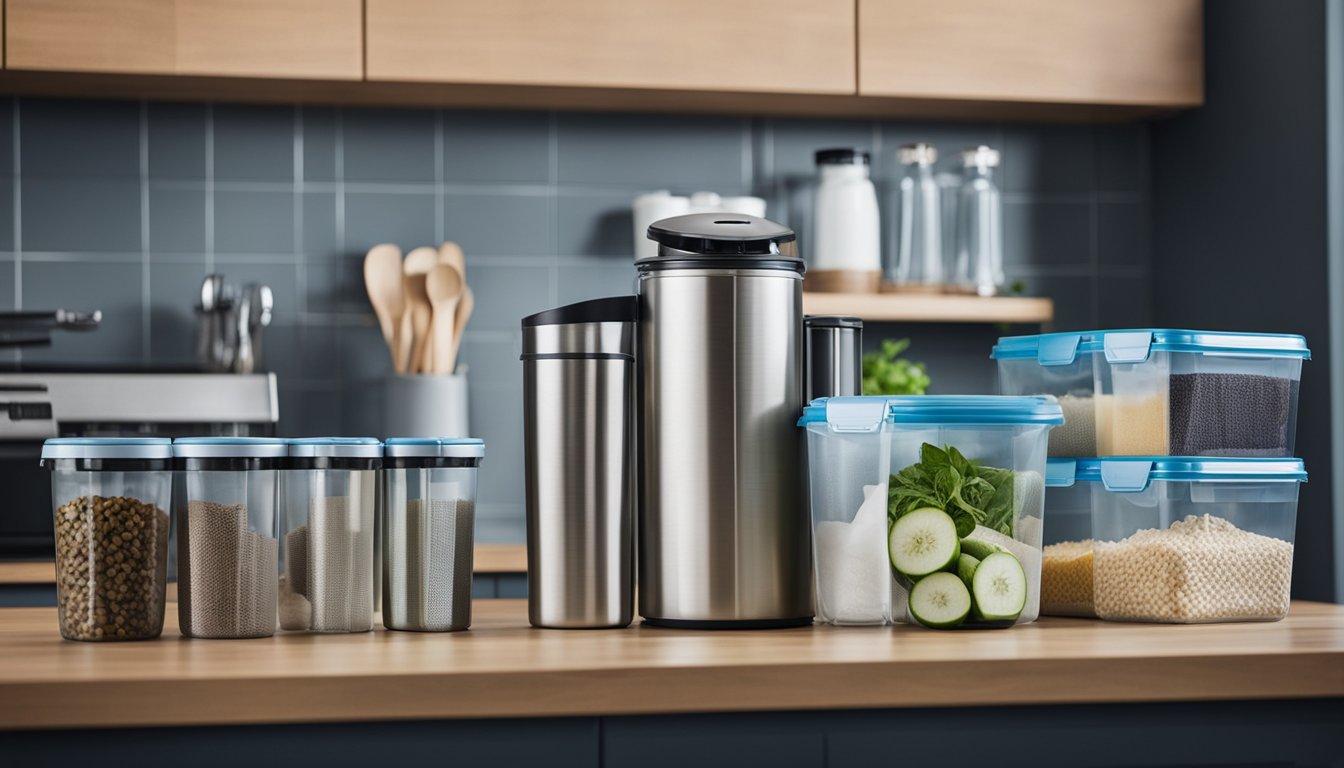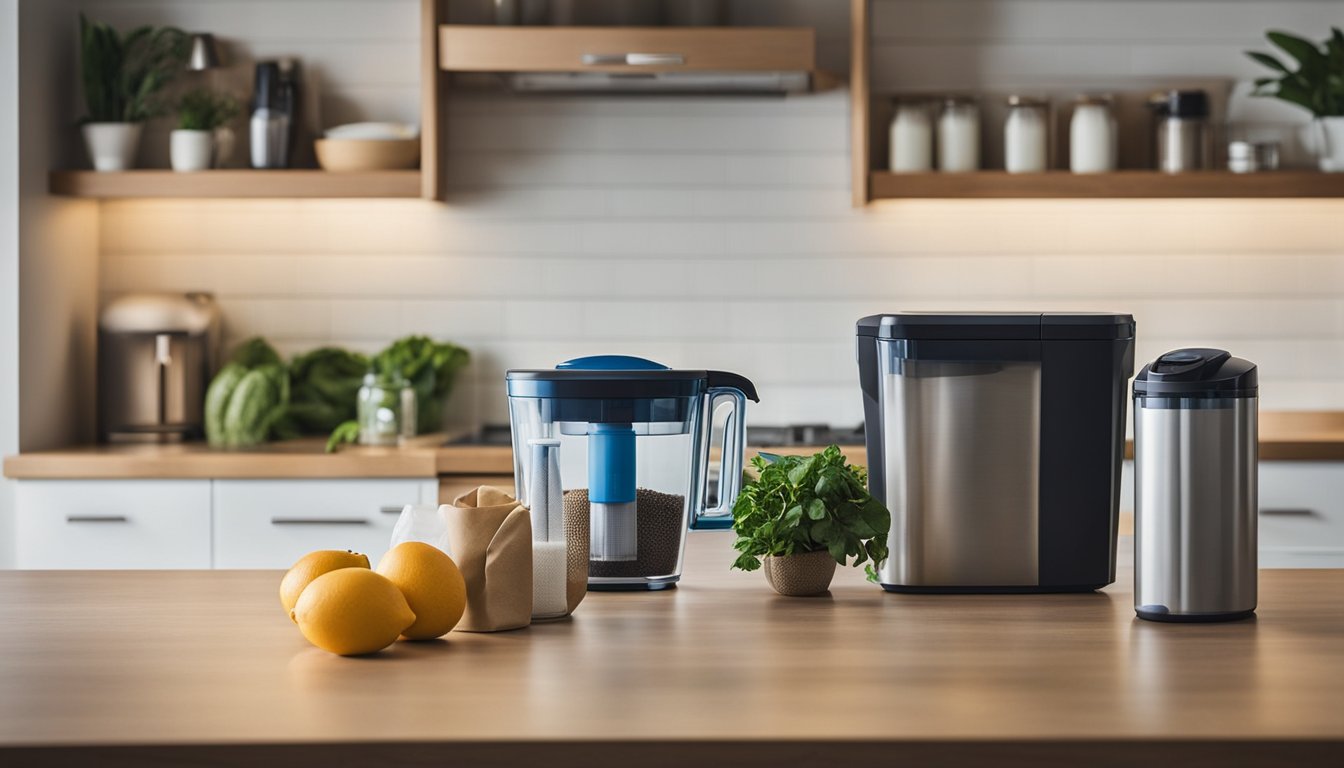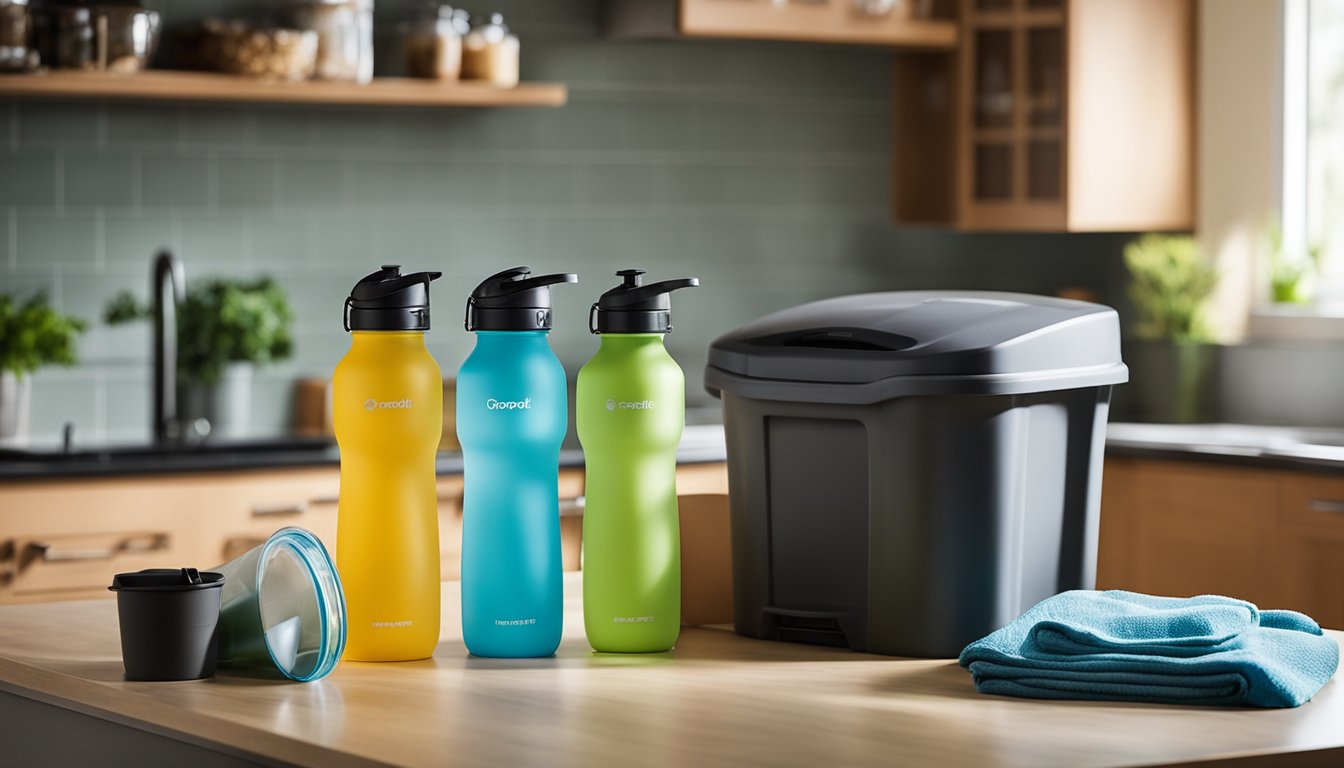Late updated: 02 Apr 2025 11:04
Written by: Sarah Hollister
How To Reduce Single-Use Plastics At Home: Simple Steps for a Greener Lifestyle
In a world increasingly aware of its environmental responsibility, reducing single-use plastics at home has never been more critical. Making sustainable choices can significantly minimise our plastic consumption and its harmful impact on the planet. Replacing common single-use items like bags, bottles, and straws with reusable alternatives is a practical step we can all take to combat plastic pollution.

The convenience of plastic comes with severe consequences for both our health and the environment. By opting for glass or metal storage containers and using beeswax wraps in the kitchen, we embrace a more sustainable lifestyle. Shopping with reusable bags and avoiding products packaged in unnecessary plastic can further diminish our plastic footprint and promote a healthier planet.
Key Takeaways
- Implement simple changes to reduce plastic use in daily life.
- Sustainable choices help mitigate the environmental impact of plastic pollution.
- Understanding our actions can lead to significant positive change.
Strategies for Minimising Plastic Consumption
Minimising plastic consumption involves adopting reusable alternatives, making conscious shopping decisions, and improving recycling practices. By focusing on these strategies, we can significantly reduce the amount of plastic waste generated and contribute to a more sustainable environment.
Adopting Reusable Alternatives
Switching to reusable alternatives is a practical way of reducing our reliance on single-use plastics. Reusable bags are essential, whether they’re made from cloth, jute, or recycled materials. These bags not only cut down on the millions of plastic bags that end up in landfills but are also robust and convenient for daily use.
Reusable food containers and bottles are equally impactful. By opting for stainless steel or glass containers, we reduce our need for plastic cling film and disposable containers. For beverages, choosing metallic or glass bottles over plastic dramatically limits waste.
Alternatives to plastic drinking items, like paper straws or bamboo ones, further this effort. Moving towards compostable utensils or cups at home and in the workplace can also reduce the presence of plastic significantly.
Making Conscious Shopping Decisions
Choosing products with sustainable packaging or those sold in bulk can diminish the demand for plastic. Buying in bulk minimises packaging waste and can sometimes reduce costs. Selecting items packaged in cardboard, glass, or aluminium instead of plastic promotes more eco-friendly consumption habits.
Improving Recycling Practices
While reducing usage is crucial, recycling also plays a vital role. Effective recycling involves sorting waste properly to ensure recyclable items are processed correctly. Knowing which plastics are recyclable according to local guidelines is key.
Integrating composting into our habits can aid waste reduction, turning organic waste into valuable compost rather than sending it to landfills along with plastics.
Participating in or supporting initiatives that focus on plastic waste removal, like community cleanup days or donating to organisations that champion eco-friendly alternatives, amplifies our positive impact on the environment.
Understanding the Impact of Plastic on Our Planet

Our planet faces significant challenges due to the widespread use of plastic, especially single-use items like bags and bottles. These plastics contribute to both environmental harm and our collective carbon footprint.
Assessing the Life Cycle of Plastic Products
To comprehend the extensive impact of plastic, we need to examine its life cycle. Plastic begins its journey as fossil fuels, which are extracted and refined. This process alone releases harmful greenhouse gases. Once manufactured, these products are often used briefly before they're discarded. Single-use plastic bags, for instance, are typically used for minutes but take centuries to degrade. Throughout their life cycle, they contribute to pollution and waste.
The production stage consumes significant energy resources and releases pollutants. Distribution adds another layer of carbon emissions, especially if products are transported over long distances. By choosing sustainable choices like items made from recycled or biodegradable materials, we can mitigate some of these impacts. This approach emphasises reducing reliance on plastics overall.
Exploring the Consequences of Plastic Pollution
Plastic pollution significantly affects our ecosystems and health. When improperly disposed of, plastic ends up in the world's oceans and landscapes, harming wildlife and natural environments. Synthetic fibres from clothing contribute vastly to microplastic pollution. These particles are ingested by aquatic life and enter the food chain, posing risks to both animals and humans.
Environmental impact extends to soil and water pollution. Plastics release toxic substances as they degrade, contaminating land and water resources. This process affects soil fertility and aquatic life. Addressing plastic pollution requires global cooperation, focusing on reducing usage and improving waste management practices. We need to prioritise awareness and responsible choices to combat the ongoing crisis effectively.
Frequently Asked Questions

Our focus is on practical ways to cut down on single-use plastics at home. We’ll explore strategies families can adopt, innovative approaches, and actionable steps individuals can take to manage plastic waste effectively.
What are effective methods to limit plastic waste in the household?
To limit plastic waste, we can start by replacing single-use items with reusable alternatives. This includes swapping plastic bags, straws, and cutlery for reusable versions made from sustainable materials. We should also aim to buy products with minimal plastic packaging.
What strategies can families implement to cut down on single-use plastics?
Families can implement strategies such as bulk buying, using refill stations, and making homemade household cleaners stored in glass bottles. Another effective strategy is involving every family member in recycling efforts, ensuring everyone understands and participates in reducing plastic use.
Could you suggest innovative approaches to reduce plastic consumption domestically?
Innovative approaches might include setting up compost bins to deal with organic waste and thereby reduce the need for plastic garbage bags. We can also explore using beeswax wraps instead of plastic wrap, or investing in high-quality, long-lasting storage containers.
How can individuals contribute to plastic waste management at home?
Individuals can contribute by maintaining and repairing plastic products to extend their lifespan, reducing the need for replacements. Additionally, buying second-hand plastic items and prioritising products made from recycled materials can significantly cut down on household plastic waste.
What are practical steps to minimise the reliance on plastic products in daily life?
Practical steps include carrying a reusable water bottle and coffee cup, choosing products packaged in glass, metal, or paper, and avoiding items with excessive plastic packaging. Learning to refuse plastic options, like straws in drinks when dining out, also makes a difference.
How might one execute a successful plan for decreasing domestic plastic usage?
Executing a successful plan involves setting clear goals, like reducing plastic purchases by a certain percentage each month. We can track progress through regular audits of household waste and adjust strategies as needed, fostering continuous improvement in reducing plastic reliance.
